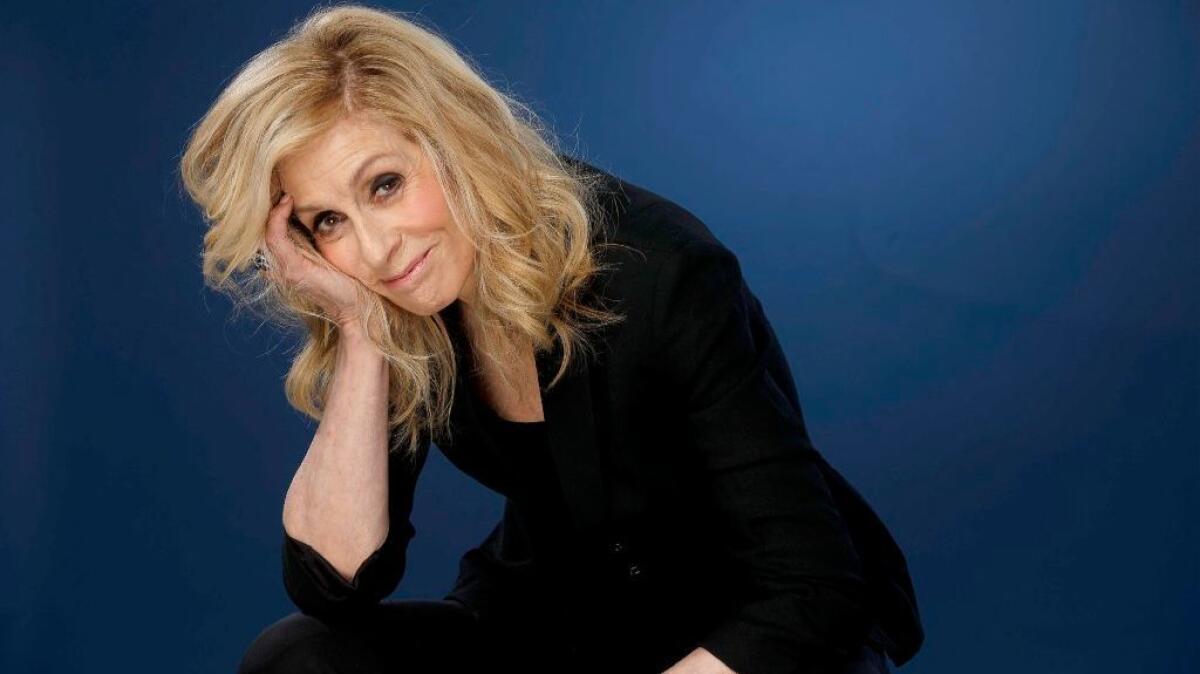Judith Light promises ‘Transparent’s’ Shelly is finding her true voice

Few actresses have taken a more zigzagging route through the entertainment industry than Judith Light. Some fans revere her for her stint on the soap opera “One Life to Live,” for which she won two Daytime Emmys. Others remember her as the powersuit-clad working mom on the ’80s hit sitcom “Who’s the Boss?” Then there are the theater fans who have watched her dazzle audiences in such plays as “Other Desert Cities” and “The Assembled Party,” for which she won Tony Awards.
Most recently, Light’s been playing Shelly Pfefferman on Jill Soloway’s series “Transparent,” a role that has nabbed her a supporting actress Emmy nomination for a second year in a row. Shelly finally began to blossom after several seasons of lurking in the shadow of her transitioning ex-husband Maura’s journey of self-discovery.
“I have thought to myself, who in the world would cast the Judith Light who played Angela in ‘Who’s the Boss’ as Shelly Pfefferman in ‘Transparent’?” says the 68-year-old actress, her eyes welling up. “In a business that likes to pigeonhole people, Jill Soloway has a lot of vision.”
We finally got a glimpse of Shelly’s back story in Season 3, and it was really sad. Is that going to be a catalyst for her?
Maura is leading the way for the rest of the Pfeffermans, as a model of how to be your real self. Don’t you find it extraordinary that [this show] is about a transgender person who is making a break for their freedom when they’re 70 years old? Maura is saying: I’m unwilling to die not having lived the life that I want to live. So now Shelly can move into a place where she says, I have a secret too. [whispers] I can’t tell you all of it yet, but I’m going to find my voice.
People in the family treat Shelly like she’s a bit of a joke.
She’s incredibly narcissistic, and she drives everybody else crazy in her attempt to connect, because she doesn’t want to be alone. We all behave in particular ways to protect ourselves and stay secure, which, of course, is a losing battle.
But then in the Season 3 finale, Shelly performs her one-woman show “To Shell and Back” and sings a heartbreaking rendition of Alanis Morissette’s “Hand in My Pocket” — and suddenly she’s not a joke anymore.
People have said to me, “We wept when we saw that.” I think we all weep when we see someone go beyond their limitations or their biggest fear and we cheer for them, because we know what it costs. I think that’s what makes great art. We are all weeping for ourselves and how many times we closed ourselves down.
I would like to see the rest of “To Shell and Back.”
I think a lot of people would — for maybe five minutes!
You did a very graphic bathtub scene in Season 2, which Soloway has referred to as a revolutionary moment in terms of showing an older woman’s sexual pleasure. How much did you discuss that before you shot it?
Oh, my God, where to begin? When I saw it in the script, I said, “I can’t do this.” What I meant was: I don’t know how I’m going to get myself to this place. But I knew how important it was in the grand scheme of things. How many times in television have we been told, “Nobody wants to see that.” It was like, Oh, yeah? So it was freeing to see that scene. It kicked down a door. And the [shoot itself] felt so safe, it was Jill and Jeffrey [Tambor] and me — and then cinematographer Jim Frohna, who was actually in the tub with us, shooting it.
You recently finished shooting Season 4. What can you tell us?
You’re going to see deep psychological dynamics come into play. Each person’s process is new and different, and some of it is really out there…. It is our most political season, but it is also about understanding all sides of the issues. We want to get rid of that ‘otherness’ that comes about because one group of people needs to feel superior to another.
How did you originally connect with Soloway?
I was doing a play in New York, and we had this 45-minute Skype call where we basically just talked about our advocacy for the LGBTQ community.
So she knew about your history as an activist?
Yes, I had been involved since the early days of the AIDS pandemic, when it was devastating the theater community. I said, “This community is inspiring, is courageous. They can teach all of us how to be that kind of human being…. And now the transgender community — that community has been so shunted aside. To this day [they suffer] such hate crimes. And again, you look at them and they rise. They are living examples of what it means to be your true self, to be the person you know you were made to be.
See the most read stories this hour »
ALSO:
For Susan Sarandon to play Bette Davis, it helped knowing Ryan Murphy was as scared as she was
Anthony Anderson keeps it real on ‘black-ish,’ except for the time he made his son take the fall
More to Read
From the Oscars to the Emmys.
Get the Envelope newsletter for exclusive awards season coverage, behind-the-scenes stories from the Envelope podcast and columnist Glenn Whipp’s must-read analysis.
You may occasionally receive promotional content from the Los Angeles Times.







